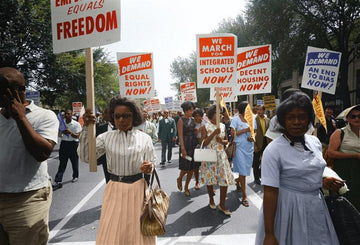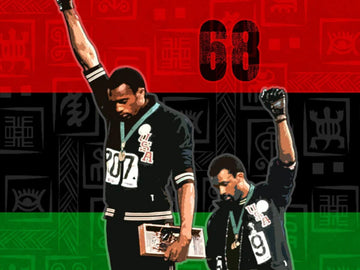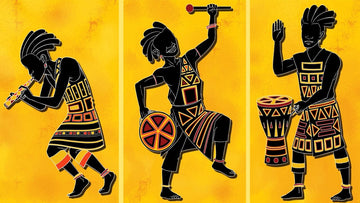
During Slavery, Reconstruction Phase, and Civil Rights Movements, a prevalent number of black women have suffered from inequality, racism, white terror, and verbal harassment. Despite the challenges, black women in the civil rights movements undertook a range of indispensable positions. They have led many black protests in America with a plethora of key roles such as founders, protesters, organizers, fundraisers, and strategists.
Throughout history, African-American women have struggled relentlessly in the fight against racism and sexism. These black women civil rights leaders have dedicated their lives to fighting for all inequalities in terms of skin color, gender, and discrimination against classes in society.
Let's dive into these wonder women's lives who don't need a miracle rope to implement justice!
Table of Contents
Domestic Life for Women in The Civil Rights Movements
During the civil rights years of the 20th century, African-American women compared to men, in general, suffered harsher and more brutal discrimination. They are forced to accept heavy manual work and are considered inferior in today's society with lower wages than men with comparable workloads, and often away from home.
Nonetheless, the accomplishments of these women should be celebrated from both a feminist and an anti-racism standpoint. African American women were natural 'bridge leaders' due to their involvement in the household and the neighborhood. They worked in the background in communities and provided mobilize support for the cause on a local level.
In the 1960s, black women not only successfully led civil rights protests, but also stretched their impact on concerns such as poverty, feminism, and other societal inequalities.

Black Panthers Women by Rainalee111 is licensed by CC BY-SA 4.0
Historical events would depict a civil rights movement centered on famous male individuals while failing to adequately acknowledge female participation. While women are rarely recognized for their contributions during this period, they were key players in carrying out a forceful and successful campaign.
Rosa Parks (1913-2005)
Rosa Louise McCauley Parks was one of the most renowned black women civil rights leaders famous for her indispensable role in the Montgomery bus boycott. The US Congress has recognized her contribution as "the first lady for civil rights" and "the mother of the liberal movement".
On December 1, 1955, in Montgomery, Alabama, Parks refused an order from bus driver James F. Blake to leave a row of four seats empty in the "colored" area to make way for a white passenger and lead to her subsequent unjust arrest.
Parks wasn't the first to fight discrimination on buses, but her actions helped inspire the black community to boycott Montgomery buses. This took a heavy toll on the bus company and the arrest was recognized by federal courts as unconstitutional under the Equal Protection Clause of the 14th Amendment of the US Constitution.

Rosa Parks being fingerprinted by Deputy Sheriff D.H. Lackey by Associated Press; restored by Adam Cuerden, Public domain
Rosa Park's courageous action then has become a symbol of the Montgomery bus company boycott movement afterwards. Short time later, she began collaborating with black activists such as Edgar Nixon and Martin Luther King Jr and involved in equal rights activism.
At the time, Parks worked as a seamstress at a local department store and was the secretary of the Montgomery chapter of the NAACP. She later attended Highlander Folk School, a Tennessee center to train workers' rights and racial equality activists. From 1965 to 1988, she served as a secretary for John Conyers, the United States' African American Representative. She was also active in the Black Power movement and support of political prisoners in America.

Rosa Parks with Martin Luther King by Ebony Magazine, Public Domain
Parks published her memoirs after retiring, emphasizing that there was still work for improvements in the liberation struggle. She has received national recognition, including the 1979 Spingarn Medal. of the NAACP, the Presidential Medal of Freedom, the Congressional Gold Medal, and a posthumous statue in the National Great Hall of the United States Congress.

Rosa Parks by John Mathew Smith & www.celebrity-photos.com is licensed by CC BY-SA 2.0
After she died in 2005, she was the first woman to be inducted into the Capitol Rotunda. California and Missouri honor Rosa Parks Day according to her birthday on February 4, while Ohio and Oregon, on the other hand, celebrate her on the day of her arrest, December 1.
Learn more: "Nah - Rosa Parks": How A Badass Woman Became A Symbol Of The Civil Rights Movement
Daisy Bates (1914-1999)
Daisy Bates was a black woman civil rights activist who co-founded The Arkansas Press, a weekly newspaper that fought for civil rights, with her husband. Bates became president of the NAACP's Arkansas chapter and was active in school integration in Arkansas following the Brown v. Board of Education decision. Bates was the one who coordinated the Little Rock Nine, the students that integrated Little Rock Central High School in 1957.

Daisy Lee Gatson Bates by Ebony Women, Public domain
In 1929, she and her husband settled in Little Rock. Here the couple founded the Arkansas Weekly newspaper. The Arkansas Weekly is one of very few African American journals dedicated exclusively to Black Civil rights that was distributed throughout the state. Bates not only contributed as an editor, but she also published articles on her own on a regular basis.
At the time, Bates additionally engaged with regional civil rights organizations as an active member. She then become the first woman who served as president of NAACP's Arkansas State Conference for years and made significant improvements.
Daisy Bates' most visible success as a black woman civil rights leader in fighting to eliminate discrimination in Arkansas was as the supervision of the Little Rock Nine.
Segregated schools were declared illegal by the Supreme Court in 1954. Following the verdict, Bates began enrolling African American pupils in all-white schools. School boards frequently declined to admit black students. Bates utilized her publication to highlight the schools that did comply with the government obligation.
Despite being repeatedly rejected by numerous Arkansas public schools, she continued her efforts as a docile battle for black people’s opportunity to attend school. After bringing the Little Rock Central High School to trial in 1954 for refusing black pupils, she was one of the first nine Black students to register at this university in 1957.

Arkansas Women's Hall of Fame: Daisy Bates by Ferd Kaufman, Associated Press, Public Domain
Following the triumph of the Little Rock Nine, Bates worked hard to improve the position of African Americans in the South. Her important work with school desegregation earned her national acclaim. Her recollections, The Long Shadow of Little Rock, were published in 1962. The novel earned her an American Book Award.
Bates passed away on November 4th, 1999. Daisy Gatson Bates Day then was established by the state of Arkansas in recognition of her contributions. At the same time, she was subsequently rewarded Medal of Freedom.
Shirley Chisholm (1924-2005)
Shirley Chisholm was born on November 30, 1924, in Brooklyn's Bedford-Stuyvesant district. She was the eldest daughters of immigrant couple, Charles St. Hill, a British Guiana manufacturing worker, and Ruby Seale St. Hill, a Barbadian seamstress. Shirley went to Brooklyn College for a bachelor’s degree in sociology, where she was prohibited from joining university club due to her race.
In 1946, she graduated and started working at two childcare centers in New York. After joining the Brooklyn Department of Child Welfare, she began her political career with the first act of participating in the League of Women Voters to fight for the suffrage of women, especially African American Females.

Shirley Chisholm was the very first black female elected to Congress from New York's 12th congressional district in 1968. She was also the first black candidate from a main party to apply for US president in 1972.
At that moment, Shirley was working for many parliamentary committees and was a charter member of the Congressional Black Caucus and the National Women's Political Caucus. During her political career, this female politician had achieved numerous accomplishments in the House before retiring from diplomacy in 1983.
Chisholm's bravery and tenacity in fighting for her principles can be seen in all of her publications, statements, and activities either in or out of government. Many institutions, such as the National Organization of Women, the League of Women Voters, the National Association for the Advancement of Colored People (NAACP), Americans for Democratic Action (ADA), and the National Political Women's Caucus, have marked her active participation in beginnings, operating, and fiercely supporting them.

President William J. Clinton Greeting Shirley Chisholm by National Archives and Records Administration, Public domain
As she once said in the last years of her life: "I want history to remember me not only as the first black woman elected to Congress, not as the first black woman to run for president of the United States, but a black woman who lived in the 20th century and dared to be herself."
Coretta Scott King (1927-2006)
Coretta Scott King was an African American novelist, activist, and civil rights, pioneer. She was born on April 27, 1927, in Marion, Alabama, United States. As a student at Antioch College in Yellow Springs, Ohio, young Coretta became involved in the African Americans movement, joining the Antioch chapter of the NAACP as well as the college's Race Relations and Civil Liberties committees. Coretta Scott King was one of the key women in the civil rights movement during the 1960s. She was an outspoken advocate for African-American equality.
She met Martin Luther King, Jr. in university and engaged him after their working together on civil rights issues.

Martin Luther, Coretta Scott and Yolanda Denise King, 1956 by Jet Magazine, Public Domain
She collaborated alongside her husband, the Rev. Martin Luther King Jr. and participated in the Montgomery Bus Boycott, and campaigned to get the Civil Rights Act of 1964 passed. She also used her musical talent to appear and raise funds at liberation concerts to convey the Civil Rights Movement's narrative.
In the years following her husband's murder in 1968, Mrs. King came out on top in the struggle for desegregation and became involved in the women's and LGBT rights advocates. During those time, Mrs. King had made acquainted with numerous politicians, most notably John F. Kennedy, Lyndon B. Johnson, and Robert F. Kennedy.

Coretta Scott King at the Democratic National Convention, New York City by Warren K. Leffler, Public domain
Mrs. King is being highly recognized for her civil liberties commitment. In 2009, King was honored on the Alabama Women's Hall of Fame. After her death, descended civil rights activists has called her "The First Lady of the Civil Rights Movement".
Diane Nash (1938-)
Diane Nash was a prominent organizer of the Civil Rights Movement, a co-founder of the SNCC and the Nashville Sit-in Movement, which followed the establishment of the Student Nonviolent Coordinating Committee. Her strategic and persistent support for the Freedom Riders was also significantly contributed to their success across the South.

Diane Nash and her husband by Associated Press, Common Public
Nash first attended the SNCC's founding conference in Raleigh, North Carolina in 1960, and one year later, she defended the 10 students jailed in Rock Hill, South Carolina for protest actions and denied bail. Nash and three other protesters then were also imprisoned in Rock Hill.
At the same time, Nash was indeed a pioneer in the Mississippi Freedom Rides, an initiative of the Congress of Racial Equality (CORE). She acted as a connection between media and the US Department of Justice from her headquarters in Nashville. In the summer of 1961, she was appointed as a director of the SNCC's nonviolent direct operations.
In 1962, Martin Luther King, Jr. recommended her for an NAACP New York branch award as the “driving spirit in the nonviolent attack on segregation at lunch counters.” She came back to Chicago after her involvement with the Freedom Riders and became an activist for equitable housing.
Nash was awarded the John F. Kennedy Foundation and Library's Distinguished American Award in 2003. The Lyndon Baines Johnson Library and Museum presented her with the LBJ Award for Civil Rights Leadership in the following year. She received the National Civil Rights Museum's Freedom Award in 2008. Honorary degrees were bestowed to her by Fisk University and the University of Notre Dame.
Nash's achievements in the civil rights movement were also highlighted in the movie. She appears in the films "Eyes on the Prize" and "Freedom Riders," as well as in the 2014 civil rights drama "Selma," acted by Tessa Thompson. She is also the subject of historian David Halberstam's book "Diane Nash: The Flame of the Civil Rights Movement."

Diane Nash at Germanna Community College by Germanna CC is licensed by CC BY 2.0
Wrap-up
Many nameless or unheralded women of the civil rights struggle were not honored or recognized for their contributions. A significant proportion of women's accomplishments are sometimes overlooked in lectures, and as a result, they are frequently undervalued during the civil rights struggle. They are, in fact, perhaps one of the most critical elements. This is so hazardous for children's school curriculum of the civil rights struggle since they may believe that males were the sole factor of innovation.
Women were frequently directed away from official leadership positions throughout the Black power movement due to gender norms, leading them to informal roles. This might explain why official documents failed to clarify the significant female participation in the black civil rights struggle. Nonetheless, it is worth recording so many leadership roles in which women have served. The sacrifices and dedications of these women to the strides of the American civil rights movement in the 1960s are undeniable and deserve to be honored more than anything else.
“It takes time and it hurts, but It's worth doing so.”





Very good information that needs to be a part of the history books!